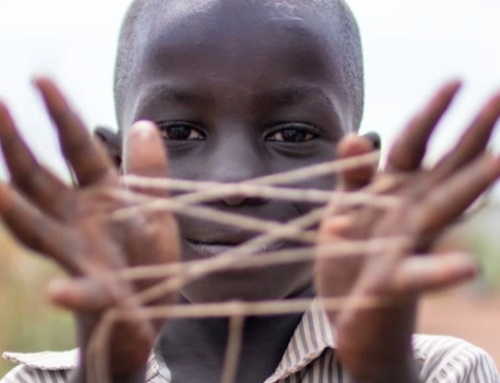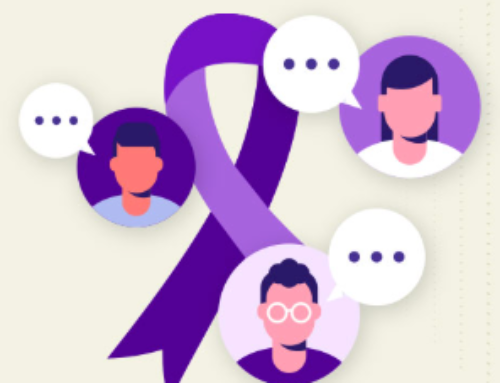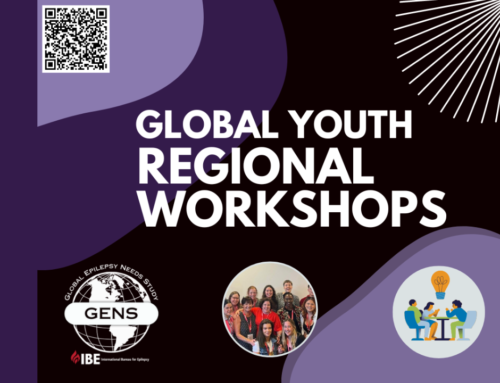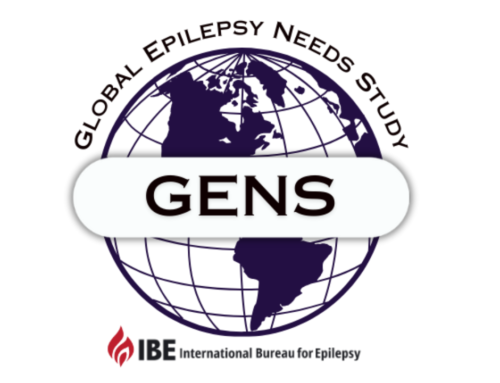Epilepsy isn’t just a medical condition; it’s a journey that profoundly impacts individuals and their families. Having an understanding of the medical aspects of epilepsy is crucial, but understanding the emotional, psychological, and social aspects is just as important.
A key focus of this year’s International Epilepsy Congress (IEC2023) will be the inclusion of speakers with lived experience. Lived experience is the insight and knowledge gained from personal experience with a particular condition. At IEC2023, people with epilepsy – and those caring for someone with epilepsy – will share their unique perspectives. These speakers will ground the Congress in real experiences, reminding attendees that every data point represents a life, a family, and a unique journey.
It is a testament to the evolving nature of IEC that speakers with lived experience are included at this year’s Congress. By bringing these speakers to the main stage, we hope to foster a more holistic understanding and inspire hope for those living with epilepsy.
Meet Our Lived Experience Speakers
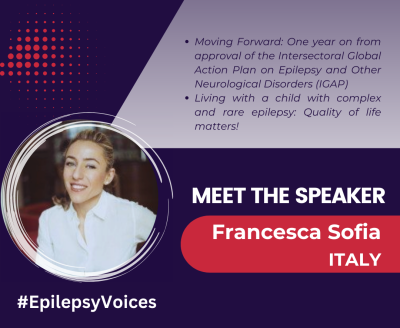
Francesca Sofia
- 4th September; 12.00-1.30 pm. Moving Forward: One year on from approval of the Intersectoral Global Action Plan on Epilepsy and Other Neurological Disorders (IGAP). What does it mean for people with epilepsy? Wicklow Hall 1
- 5th September; 0.30-11.30 am. Complex and Rare Epilepsies: The past, the present, and the future. Living with a child with complex and rare epilepsy: Quality of life matters! Liffey B
Francesca Sofia is a molecular biologist with a career in research management. She holds a Ph.D. in cellular and molecular biology with a thesis on brain development. Her second child was diagnosed with epilepsy in 2011. This life-changing event initiated her interest in collaborating with epilepsy associations nationally and internationally and led her to become an epilepsy advocate. Francesca describes her daughter’s disease as a wake-up call that infused her professional life with a new meaning and sense of urgency: her work and personal life melted together gaining strength, drive and humanity.
In 2018, she was elected member of the European Regional Executive Committee of IBE, currently serving as president for the term 2021-2025.
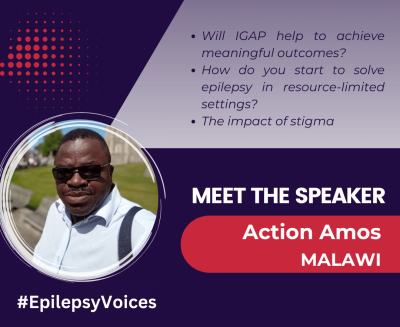
Action Amos
- 3rd September; 09.45-11.45 pm. Defining meaningful outcomes in the genomic era. Will IGAP help to achieve meaningful outcomes? Auditorium
- 3rd September; 12.00-1.30 pm. ILAE Nursing section. Domesticating the IGAP’s 90-80-70 cascade target for the epilepsy treatment gap in low- and middle-income settings. Liffey A
- 4th September; 1.00-15.30 pm. Poster Presentation. Participatory policy making by World Health Organisation (WHO): case study – inclusion of persons with epilepsy in the intersectoral global action plan on epilepsy and neurological disorder (IGAP) development. Forum
- 5th September; 12.00 – 16.30 pm. Epilepsy Nursing Practice: Identifying Common Themes and Innovative Solutions to address the Treatment Gap. The Impact of Stigma. Liffey Hall 1
Action Amos is IBE’s Vice President-Africa Region with 28 affiliates. He has a special interest in NGOs Research Ethical Practice and Mental Health Research focusing on Children and Young People and has served in various Boards as Chairperson and member both locally and internationally. He has contributed globally on issues of Mainstreaming and Inclusion of persons with disabilities and has proven experience in the area of human rights, policy analysis, research and technical application.
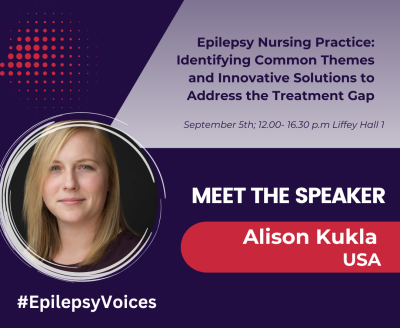
Alison Kukla
The Lived Experience. A Personal Journey with Epilepsy
Alison Kukla, MPH, is the Senior Manager for Programs and Partnerships at the Epilepsy Foundation where she providers leadership for the Foundation’s SUDEP Program and bereavement support services. She also supports dissemination of epilepsy self-management programs and establishes and maintains strategic national partnerships.
Alison is a public health professional with demonstrated success in coalition building, campaign management, and engagement strategy development in a variety of fields at the local, state, and federal level. She has a Master of Public Health in prevention science from Rollins School of Public Health, Emory University.
Alison is also a Person with Epilepsy, an Epilepsy Advocate, and former staff in President Obama’s White House and US EPA.
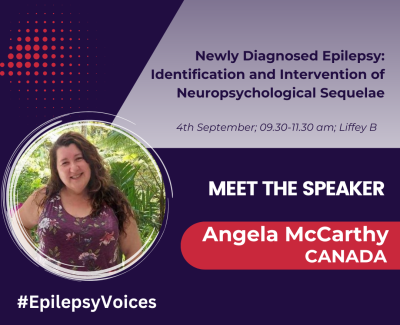
Angela McCarthy
The Patient Perspective: A Parent’s Point of View
Angela and her family live in Nova Scotia, Canada. A proud mother of two adult children, she recently became a grandmother with the arrival of a beautiful granddaughter.
Raising awareness and advocating on behalf of people with epilepsy is Angela’s passion. Her passion grew when her daughter, Cassidy Megan, was diagnosed with epilepsy at the age of 7. After that, she engaged with the local epilepsy agency and various organizations in Canada and North America. A major focus of Angela’s work is Cassidy’s Purple Day initiatives around the world.
Besides epilepsy-related causes, Angela supports other community and non-profit groups to boost fundraising and awareness, continuing to build upon her early childhood education and human resources background by pursuing further learning and courses. Dedicated to epilepsy, mental health, and collaborative efforts, she believes in teamwork and giving back. She believes kindness ensures no one travels alone, ensuring collective impact. In her leisure time, Angela enjoys family and friend gatherings, exploring new readings, and embracing novel experiences.
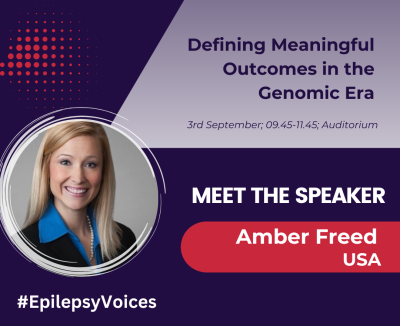
Amber Freed
What is a Meaningful Outcome: The Lived Experience
Amber and her husband Mark, are the parents of twins, Riley and Maxwell. When Maxwell was 18 months old he was diagnosed with SLC6A1 epileptic encephalopathy – an autosomal dominant genetic disorder characterized by the loss-of-function of one copy of the human SLC6A1 gene.
Amber left her career in equity analysis the day Maxwell was diagnosed and dedicated her life to finding a cure. She serves as the Founder and CEO of SLC6A1 Connect. SLC6A1 Connect’s work has elevated awareness and created an ecosystem that can systematically help fund and consolidate research and treatment efforts.
She was nominated for the Global Genes Rare Champion of Hope Award, is a member of the Rare Advocacy Movement and sits on the Board of CombinedBrain. Amber can be reached at any hour of the day to advance science.
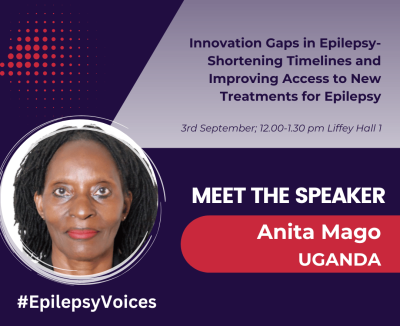
Anita Mago
Experience Regarding Sustainable Access To Medication and the Routes To Getting It – Including Barriers And Options For Newer Therapies.
Anita Mago is the Program Director at Purple Bench Initiative an organisation addressing society’s biggest challenges stemming from lack of epilepsy awareness. Her own success story inspires Anita to mentor epilepsy caregivers. Anita has played a major role in the establishment of several development organisations in Uganda including the only Women’s FM radio, Mama FM; Plan International, Rural Integrated Development Organization and Purple Bench Initiative, among others.
Anita holds a Master of Science degree in Extension for Natural Resource Based Livelihoods -University of Reading UK., BA in Mass communication-Makerere University Kampala, and has undertaken several post-graduate trainings. Having left active broadcast journalism as a program producer/presenter and live commentary broadcaster, Anita joined international development where she is a specialist in sustainable development and has worked for the International Women’s Club of Moscow, Uganda Red Cross, Plan International and Foundation Sustainable Development.
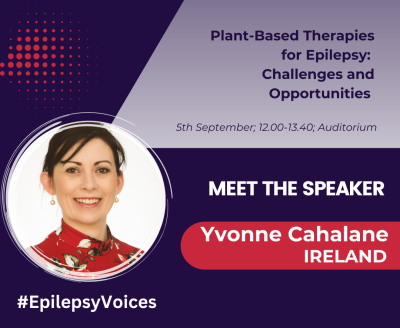
Yvonne Cahalane
Plant-Based Therapies for Epilepsy: A Patient Experience
Mother to two young boys, Yvonne Cahalane advocated for medical cannabis treatment for her son Tristan in 2015 and was deemed ‘the pathfinder’ in accessing medical cannabis for patients in Ireland.
Creating history by gaining the first license for medical cannabis in Ireland in 2016 which opened the doors for other patients in Ireland. Yvonne continues to advocate for safe and wider access to medical cannabis for patients in Ireland.
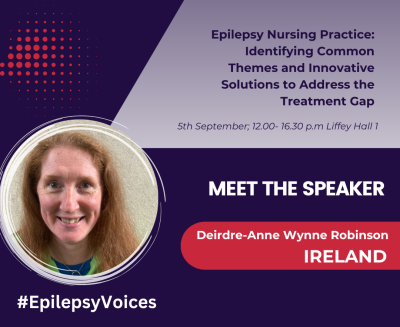
Deirdre-Anne Wynne Robinson
The Lived Experience: A Personal Journey of a Parent of a Child with Epilepsy and Co-Morbid Condition
Deirdre-Anne Wynne Robinson was diagnosed with Epilepsy at sixteen when her seizures became noticeable. She has been a patient advocate for Epilepsy as a media volunteer for Epilepsy Ireland, going so far as to allow her brain surgery to be filmed in 2007. Although she still has seizures herself, she is working with her neurologist to control them, and will never give up hope that they will, one day, come under control.
When not dealing with Epilepsy, she prefers Ballroom Dancing, though occasionally does both simultaneously. She is married to James, whom she met at the Dance Society in Trinity College Dublin, and they have one daughter, Casey Anne.
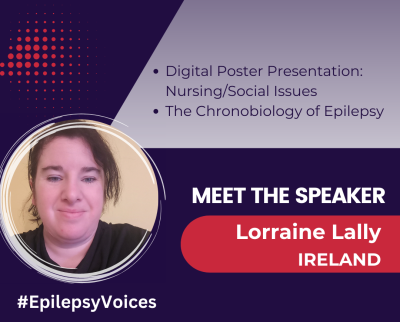
Lorraine Lally
PPI Perspective on the ICHOM’s Epilepsy Set of Patient-Centered Outcome Measures
Risks and Triggers to Seizures – The Patient Perspective
Lorraine Lally is an Irish barrister, mediator, and member of the Bar Council of Ireland. She holds an LL.B in Irish Law and an LLM (International Human Rights) from the Irish Centre for Human Rights at the National University of Ireland Galway (NUIG). She also holds an LLM (International Financial Services Law) from University College Dublin.
In addition to advocating for those with epilepsy, Lorraine believes there is a need to educate others about epilepsy and to support them. She has been appointed as an Authority Member of the National Disability Authority and a Member of the Charities Regulatory Authority. She is also involved in advocacy campaigns for the National Women’s Council of Ireland, the Disability Federation of Ireland, the Neurological Alliance of Ireland, and Epilepsy Ireland.

